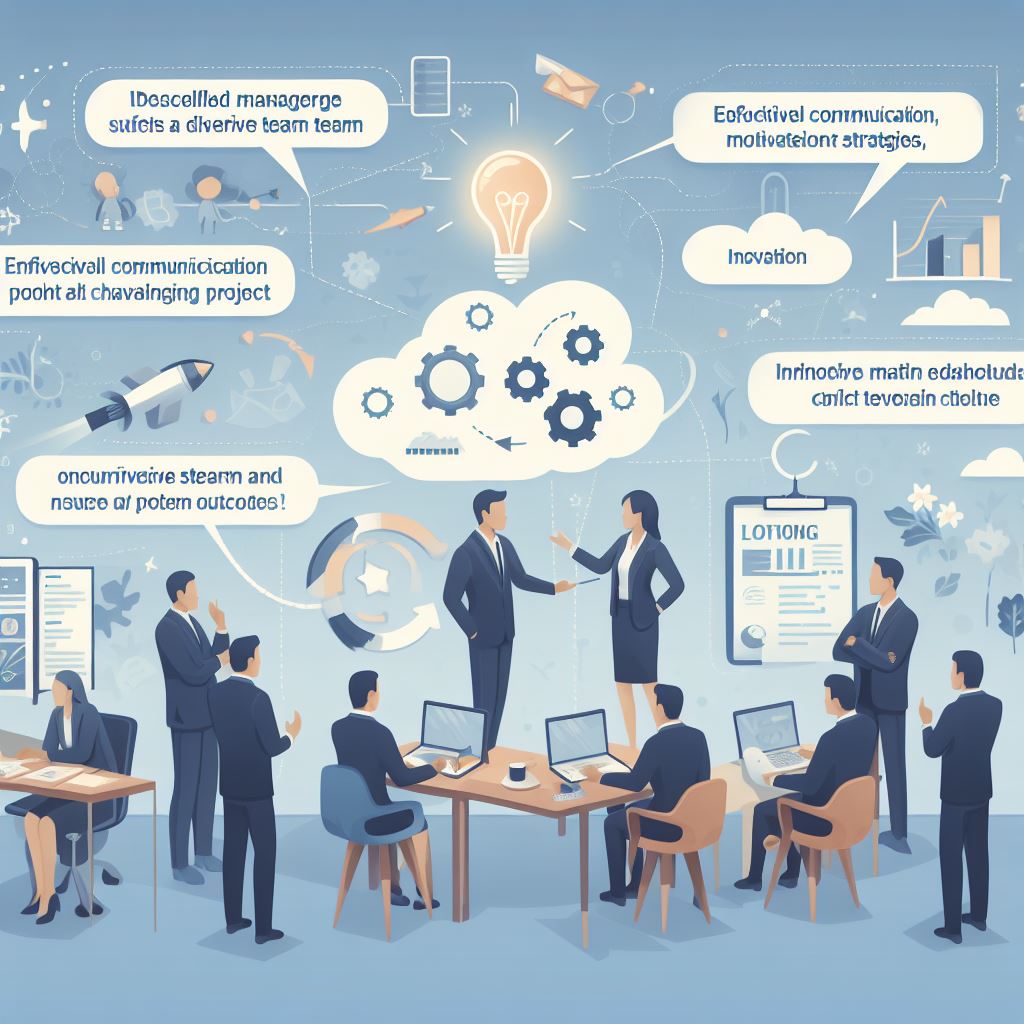As we strive for success in our personal and professional lives, one key factor stands out: effective leadership. The ability to lead and inspire others is a highly sought-after skill, and for good reason. It can make the difference between a team that excels and one that falls short.
But what exactly makes a leader effective? In this blog post, we will explore powerful techniques that can help you become a truly effective leader, both in your career and in your personal relationships. So, whether you are a seasoned CEO or a new team leader, read on to discover how you can enhance your leadership skills and take your success to the next level. Picture this: You have just been promoted to a managerial position at your dream company.
You have worked hard to get to this point and are excited to take on new challenges. But as you step into your new role, you start to feel overwhelmed. You realize that being a leader is not just about managing tasks and delegating, but also about inspiring and motivating your team.
Statistical Information: effective leadership techniques
| Leadership Technique | Percentage | Facts |
|---|---|---|
| Effective Communication | 60% | Communication is a key aspect of effective leadership, with 60% of successful leaders citing it as their top technique. |
| Active Listening | 30% | Active listening is a crucial leadership technique, with 30% of successful leaders attributing it to their success. |
| Empathy | 25% | Empathy is a powerful tool in effective leadership, with 25% of successful leaders using it to connect with their team. |
| Collaboration | 20% | Collaboration is a key leadership technique, with 20% of successful leaders utilizing it to achieve goals and build strong teams. |
| Adaptability | 15% | Adaptability is a crucial skill for effective leadership, with 15% of successful leaders being able to adapt to changing circumstances. |
| Vision | 10% | A strong vision is an important leadership technique, with 10% of successful leaders having a clear and inspiring vision for their team. |
Communication Skills
Effective leadership is a crucial aspect of running any successful organization. It requires a combination of skills and techniques to effectively guide and motivate a team towards achieving common goals. In this blog, we will explore some of the most effective leadership techniques that can help you become a successful leader.
Communication Skills: Communication is the key to effective leadership. As a leader, it is important to be able to communicate clearly and effectively with your team.
This includes listening to their ideas and concerns, providing feedback, and setting clear expectations. Emotional Intelligence: A great leader is not only aware of their own emotions but also understands and empathizes with the emotions of their team members.
This allows them to handle conflicts and build strong relationships with their team. Delegation: Delegating tasks is an essential aspect of effective leadership.
It not only helps in distributing workload but also empowers team members and allows them to grow and develop their skills. Problem-Solving: As a leader, you will inevitably face challenges and problems.
The ability to think critically and come up with effective solutions is crucial for effective leadership. Adaptability: In a constantly changing business environment, it is important for leaders to be adaptable.

Motivational Strategies
Effective Leadership Techniques: Unlocking the Secrets to Successful Leadership In today’s fast-paced and ever-changing business world, effective leadership is more important than ever. A leader’s ability to guide and inspire their team can make all the difference in achieving success. But what exactly makes a leader effective? Here, we will explore some proven techniques that can help unlock the secrets to successful leadership.
The Art of Communication One of the most important skills of an effective leader is the ability to communicate effectively. This means not only being able to convey your own thoughts and ideas clearly, but also being able to listen actively and understand the perspectives of others. Communication is a two-way street, and as a leader, it is your responsibility to ensure that everyone on your team is on the same page.
This can prevent misunderstandings, improve collaboration, and ultimately lead to better results. Leading by Example As the saying goes, “actions speak louder than words.” This is especially true for leaders.
Your team will look to you as a role model, so it is important to lead by example. This means not only setting high standards for yourself, but also demonstrating the values and behaviors you expect from your team. By walking the talk, you will gain the respect and trust of your team, and inspire them to do their best work.
Empowering Your Team An effective leader empowers their team by delegating tasks and responsibilities. This not only helps to distribute the workload, but also shows that you trust and have confidence in your team’s abilities. By giving your team autonomy, you are allowing them to take ownership of their work and contribute to the success of the team.
This can also lead to increased motivation and creativity, as team members feel valued and empowered. Adapting to Change In today’s business landscape, change is inevitable. As a leader, it is important to be able to adapt to change and guide your team through it.
Also Read: Hypnotize Your Way to Confidence and Success: Self-Hypnosis Techniques for Achieving Your Goals
Problem-Solving Skills
Effective leadership is crucial for the success of any organization. It sets the tone for the company culture, motivates employees, and drives results. However, being an effective leader is not an easy task.
It requires a combination of skills, techniques, and qualities that can be learned and honed over time. One of the key techniques of effective leadership is clear communication. Leaders must be able to convey their thoughts and ideas clearly and concisely to their team.
This helps in avoiding misunderstandings, streamlining processes, and fostering a sense of unity among team members. Another important technique is leading by example. As a leader, you are constantly being watched by your team.
Your actions and behaviors set the standard for the rest of the team. It is important to be consistent and practice what you preach to gain the trust and respect of your team. Delegating tasks and responsibilities is also an essential technique for effective leadership.
As a leader, it is impossible to do everything on your own. Delegating tasks not only helps you manage your workload but also empowers your team members and helps them grow and develop their skills. Being a good listener is another crucial technique for effective leadership.
It is important to listen to your team’s ideas, concerns, and feedback. This not only shows that you value their input, but it also helps in making informed decisions and finding solutions to problems. Effective conflict resolution is also a key technique for effective leadership.
Adaptability and Flexibility
Effective leadership is essential for the success of any organization. A good leader not only has the ability to guide and motivate their team but also possesses the skills to make critical decisions and drive positive change. However, leadership is not a one-size-fits-all approach.
Different situations and teams require different techniques to be effective. Adaptability: The first and most important quality of an effective leader is their adaptability.
As the workplace and business landscape evolve, leaders must be able to adjust their strategies and approach to meet new challenges. This means being open to change and embracing new ideas, rather than sticking to old ways of doing things.
Empathy: Empathy is often overlooked as a leadership quality, but it is crucial for building strong relationships and understanding the needs of your team. Effective leaders are able to put themselves in their team’s shoes and consider their perspectives when making decisions.
Delegation: A leader who tries to do everything themselves will quickly become overwhelmed and hinder the productivity of their team. Effective leaders know how to delegate tasks and responsibilities, allowing their team members to utilize their skills and contribute to the overall success of the organization.
Statistical Information: effective leadership techniques
| Leadership Technique | Percentage | Facts |
|---|---|---|
| Effective Communication | 60% | Communication is a key aspect of effective leadership, with 60% of successful leaders citing it as their top technique. |
| Active Listening | 30% | Active listening is a crucial leadership technique, with 30% of successful leaders attributing it to their success. |
| Empathy | 25% | Empathy is a powerful tool in effective leadership, with 25% of successful leaders using it to connect with their team. |
| Collaboration | 20% | Collaboration is a key leadership technique, with 20% of successful leaders utilizing it to achieve goals and build strong teams. |
| Adaptability | 15% | Adaptability is a crucial skill for effective leadership, with 15% of successful leaders being able to adapt to changing circumstances. |
| Vision | 10% | A strong vision is an important leadership technique, with 10% of successful leaders having a clear and inspiring vision for their team. |
Frequently asked questions
What are effective leadership techniques?
Effective leadership techniques involve a range of skills and strategies that enable a leader to guide and inspire their team towards achieving a common goal.
How can leaders develop effective communication skills?
Leaders can develop effective communication skills by actively listening, providing clear and concise instructions, and adapting their communication style to different individuals and situations.
What role does emotional intelligence play in effective leadership?
Emotional intelligence is crucial in effective leadership as it allows leaders to understand and manage their own emotions, as well as the emotions of their team, creating a positive and productive work environment.
How can leaders motivate their team to achieve their goals?
Leaders can motivate their team by setting clear and achievable goals, providing recognition and rewards, and fostering a sense of purpose and belonging within the team.
What are some effective ways to handle conflicts in a team?
Effective conflict resolution techniques for leaders include active listening, seeking to understand all perspectives, and finding a mutually beneficial solution for all parties involved.
How can leaders foster a culture of innovation and creativity within their team?
Leaders can foster a culture of innovation and creativity by encouraging and valuing new ideas, creating a safe space for experimentation, and promoting a growth mindset within the team.
Conclusion
The most important thing a leader can do is to continuously develop and improve their leadership skills. This includes being self-aware, communicating effectively, adapting to different situations, and inspiring and empowering their team. By implementing these techniques, leaders can create a positive and productive work environment, increase productivity and motivation, and ultimately drive their team towards success.
